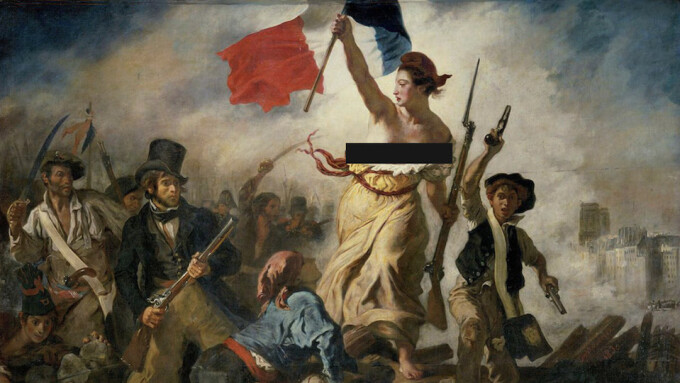PARIS — The Paris Judicial Tribunal held a hearing earlier this month with representatives from five of the most visited adult tube sites in France, and set itself a July 7 deadline to decide whether to order internet service providers in the country to block access to those sites.
The four-hour hearing involved lawyers for Pornhub, Tukif, xHamster, XVideos and Xnxx, who presented their ongoing objections to the controversial 2020 law allowing France’s online content regulator, ARCOM, to seek a blocking order to target “websites that fail to prevent minors from accessing online pornography.”
The lawyers presented requests to nullify the proceedings and order a stay of the proposed block. The tribunal then gave itself until July 7 to make a decision.
France’s age verification mandate was surreptitiously added to a hastily approved domestic violence law during an atypical and sparsely attended COVID-era session of the French Parliament in July 2020.
Action Prompted by 'Children Advocacy,' Religious Groups
As XBIZ has been reporting, ARCOM has been prompted to order a block of adult sites that do not implement the ill-defined age verification measures in response to complaints from several associations claiming to represent “the children.”
The groups — a patchwork of obscure organizations pursuing a self-appointed mission of “child protection” and sex work abolitionism — operate in tandem with anti-sex-work SWERF activists and politicians, and extremist Catholic groups like Civitas, to specifically target the five prominent tube sites.
Among the groups are Parenthood and Digital Education Watch, founded by anti-porn activist and business school graduate Thomas Rohmer; noted anti-sex-work abolitionist lobby Fondation Scelles; the National Union of Family Associations; a group calling itself Chameleon and another going by the name Respect Zone.
Lawyers for the targeted sites contended that the law was “not in line with the constitution,” but the court ruled in favor of ARCOM in January.
A Failure to Issue Clear Guidelines
The 2020 law requires that adult companies institute measures beyond simply asking an internet user whether they are of age. It also empowers a government official — the president of ARCOM — to demand that the president of the judicial court order ISP providers to immediately block infringing sites in the entire country.
According to French tech journalist Marc Rees, who has been reporting on the developments for news site Next INpact, the tube sites’ constitutional challenge is based on the legislators’ vagueness in drafting the law, which violates the legal principle of “freedom of expression and communication.”
During the April 14 hearing, lawyers for the tube sites argued that compliance cannot possibly be effected until ARCOM publishes clear guidelines, something the government has conspicuously neglected to do. Meanwhile, the complaining groups have actively fought against issuing clear content guidelines, as part of their campaign to prevent any open platforms — including Twitter and Reddit — to host whatever they may consider explicit material.
Rohmer spoke to Catholic news site La Croix earlier this month, urging ARCOM not to publish any clear content guidelines, which he called “a trap in which these sites want to snare us” and warning that his group will “fight so that it does not take place.”
The tube sites also expressed concern about not having been part of meaningful consultations about various experimental systems for age verification — like credit cards, government IDs or through a Louisiana-style third party contractor — that the Macron government has floated since September.
Moreover, the tube sites contend, ARCOM failed to correctly notify the relevant EU authorities of its intention to block access to them, as is required by the supranational union’s directives.
Arcom’s lawyer Nicolas Jouanin told Le Croix that the regulator “is not here censoring pornography” but is trying to “put an end to a serious disturbance of public order.”







